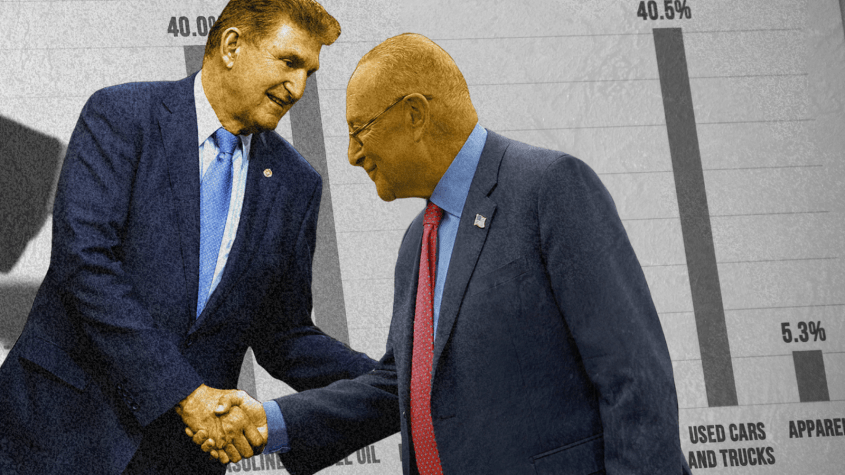Would the Inflation Reduction Act go too far, or not far enough?

- Oops!Something went wrong.Please try again later.
- Oops!Something went wrong.Please try again later.
Sen. Joe Manchin (D-W.Va.) announced last week that he had reached an agreement with Senate Majority Leader Chuck Schumer (D-N.Y.) to pass the Inflation Reduction Act of 2022. The bill, which includes over $400 billion in new climate funding, represents a pared-down version of the $1.75 trillion Build Back Better agenda Manchin scuttled in December.
The legislation also extends the expanded Affordable Care Act subsidies enacted during the early days of the COVID-19 pandemic for another three years, directs funds toward deficit reduction, imposes a 15 percent minimum corporate tax, expands the IRS, and empowers the government to negotiate the prices of certain prescription drugs with pharmaceutical companies.
Republicans have pounced on the bill as one more example of the Biden administration's wasteful, inflationary spending, while some Democrats — desperate though they were for a political win — argue it didn't go far enough. And that's assuming it passes at all.
Making the sausage
Even with Manchin's vote, the Inflation Reduction Act could still fail to pass. Writing for Vox, Li Zhou points out that Sen. Kyrsten Sinema (D-Ariz.) voted against Build Back Better in part because she "opposed closing the carried interest tax loophole," a policy that remains "a key provision of the Inflation Reduction Act." So far, the Arizona freshman has not announced a position on the bill, but if she comes out against it, Senate Democrats will be in a tough position. Manchin supports eliminating the loophole, so giving Sinema what she wants could turn Manchin against the legislation.
And even if Manchin and Sinema do vote for the bill, it's unclear how much it will help President Biden and his party politically. "I still don't see the legislation swinging a lot of votes to the Democrats in the midterms," Bret Stephens said in The New York Times. "Biden also got his big infrastructure bill passed last year and it didn't help him one bit politically," he reminded readers.
Too far?
Despite the name given to the legislation, it's also unclear whether it would do anything to decrease the 40-year-high inflation that remains Democrats' biggest electoral liability. The Wall Street Journal's editorial board described the "Schumer-Manchin bill" as a "tax increase on every American" and cited one budget model that predicted the bill's impact on inflation would be "statistically indistinguishable from zero" until 2031.
Eric Boehm of Reason derided the legislation as "an inflation-combatting ... bill that doesn't combat inflation," while Brad Polumbo said on Fox News that the bill is "basically Build Back Better 2.0" and that giving it a new name was akin to "put[ting] lipstick on a pig."
Kevin D. Williamson argued in National Review that any emissions reductions the bill manages to produce will come at too great a cost, especially considering that emissions are already declining "[t]hanks in large part to the economic displacement of coal by natural gas in electricity generating — which is to say, thanks to fracking."
Stephens objected to the drug pricing reform, claiming that "[p]rice controls inevitably lead to less innovation."
Not far enough?
Some of the bill's supporters were disappointed by how much Democrats had slashed from the Build Back Better Act to win Manchin's vote. "For all the justified celebration, the bill exposes a persistent blind spot pertaining to transportation," David Zipper wrote for Slate. Specifically, Zipper explained, the legislation dropped a BBB tax credit that would have given Americans up to $900 to buy e-bikes. "Beyond the emissions benefits, a shift from driving to e-biking also improves public health ... and helps reduce traffic deaths ... It's hard to think of a mobility innovation whose benefits are so myriad," he wrote.
Li Zhou conceded in Vox that the bill could have been more ambitious. With the passage of the Inflation Reduction Act, climate emissions are expected to be 40 percent lower in 2030 than they were in 2005, 10 points short of the goal set by the 2015 Paris Agreement. Still, Zhou wrote, the legislation is "a long way from the bleak picture last week" before Manchin came on board.
Even Williamson, no friend of the Manchin-Schumer bill, called it a "cowardly" piece of legislation that relies on "subsidies for politically connected business interests" and "handouts to upper-middle-class urban progressives" instead of doing the hard work of reining in the fossil fuel industry. "[T]he proposition that we are going to get the outcomes the Green New Dealers want simply by shoveling great heaping gobs of money to Democrats' political allies without any painful new regulation or taxes is one that deserves a great deal of skepticism," he wrote.
You may also like
Monica Lewinsky has a suggestion for another song lyric Beyoncé should change
Warner Bros. won't release $90 million Batgirl movie that was already filmed
Biden says with death of Al Qaeda's Ayman al-Zawahiri, 'justice has been delivered'

